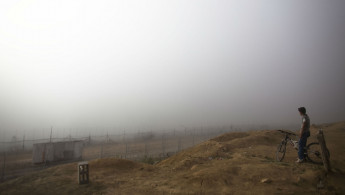Does IS territory now stretch to Israeli-occupied Golan Heights?
Abu Abdullah al-Madani, a Saudi, is believed to have been dispatched by IS to take over as "emir" of Yarmouk Martyrs' Brigade, a militant group operating in the Yarmouk Valley, bordering the Israeli-occupied Golan Heights.
Little is known about Madani, apart from that he might be on the IS payroll and hails from the Saudi holy city of Medina.
One of the leading analysts on the group believes the fact that Mandani is a foreigner is a clear indication that Yarmouk Martyrs' Brigade have moved closer to IS' sphere of influence.
"Supposedly the entire leadership council suddenly agreed to work under Madani, who arrived only very recently in the group," Aymenn al-Tamimi told The New Arab. "Logically therefore one must expect IS involvement in this shuffle."
Local force
Yarmouk Martyrs' Brigade follows a Salafi-jihadi creed, and has adopted the IS banner, rhetoric and imagery - although never formally joined the group or pledged allegiance to its self-styled "caliph" in public.
It has, however, been accused of belonging to IS by the Nusra Front, Syria's al-Qaeda franchise, which has waged war on the brigade.
The Yarmouk Martyrs' founder, al-Khal - "the uncle" - was killed in a Nusra suicide attack last year.
His replacement as leader, Abu Obaid Qahtan, was a Palestinian-Syrian born outside the local al-Baridi clan which dominates the leadership, although he was a well-respected figure due to his early affiliation with the jihadi force.
 |
Logically, one must expect IS involvement in this shuffle. - Aymenn al-Tamimi, Syria analyst |
 |
He only lasted four months in the role before being replaced by Mandani, and this reshuffle could have been a direct command by IS, say analysts.
"The most likely explanation is that it is an intervention by IS on account of the failings in Qahtan's administration. I mean, it would make no sense for the Qadat al-Saff al-Awal [the group's Leadership Council] to decide suddenly it will agree to work under this newcomer Saudi guy unless IS is ordering it," Tamimi said.
Union
During Tamimi's recent investigation, he spoke with a member of the group who said that Qahtan asked the IS leader in Damascus province to appoint a wali for the Yarmouk Martyrs' Brigade. This would confirm a marriage of sorts between the two militant groups.
However, he points out that in the brigade's announcement of Madani become leader, there was no mention of the "emir" being subordinate to "caliph" Abu Bakr al-Baghdadi - while Yarmouk fighters swore allegiance to their new Saudi commander, and not the IS leader.
The group is unlikely to make any secret union public, which would almost be suicidal for the small group already under attack by multiple rebel forces. However, Tamimi believes a formal partnership is part of the plan.
"The lack of contiguous connection between IS and Yarmouk Martyrs' Brigade is one of the main reasons it doesn't declare allegiance," said the Syria analyst.
"IS can dispatch personnel and perhaps material support to the Yarmouk Martyrs' Brigade, but the only way to turn the tide for it would be for IS to reach them, territorially speaking."
The closest forces IS could muster for such an operation are in Damascus, Qalamoun and Homs, although such a mission is unlikely to be high on the list of priorities for the Raqqa leadership, even if it were possible.
Nor is the Yarmouk Martyrs' Brigade likely to extend its territory beyond its tiny canton in south-west Daraa province.
Small numbers
So for now, the group remains isolated from the rest of IS and at war with its anti-Assad neighbours, a conflict that appears to work to the regime's advantage.
Despite subscribing to one of the extreme schools in Salafi-jihadi thought, the Yarmouk Martyrs' Brigade has been largely untouched by the Russian air force, despite other rebel groups in the area coming under heavy bombardment.
"Part of it I think has to do with the fact that the infighting is useful [for Damascus]. It bogs down Nusra and southern Jaish al-Fatah," said Tamimi.
 |
Nusra in particular seems to have been hurt a lot by this infighting |  |
"Nusra in particular seems to have been hurt a lot by this infighting. Also perhaps the understandings between Russia and Israel, [as] the territory is bordering the Golan Heights."
He said Israel or Jordan would likely intervene if the group were to officially declare allegiance to Baghdadi.
Despite being under siege, residents of Yarmouk Valley have remained largely unscathed by the war and many sympathise or support the local brigade.
The Yarmouk Martyrs' Brigade was born of popular local tribal leaders in the region; unlike other IS affiliates, it has not been transplanted from outside.
It has also meant that locals have been largely isolated from the fragmented situation in Daraa province, where multiple forces are jostling for control of a small strip of territory.
Tamimi said residents had reported a high level of popular support for the Yarmouk Martyrs' there - with one telling him they had "brought safety to the area".
"I think this fits in with a wider pattern one sees in Syria,
where the control of only one group is seen as bringing stability to an area, whereas multiple factions in one area create problems," Tamimi adds.
Yet Baghdadi's secret pocket force - if that is indeed what it is - is unlikely to last in the long-run, and will likely be swallowed up by one of Daraa's many rebel factions at some point.
Follow Paul Mcloughlin on Twitter: @paullmcloughlin



